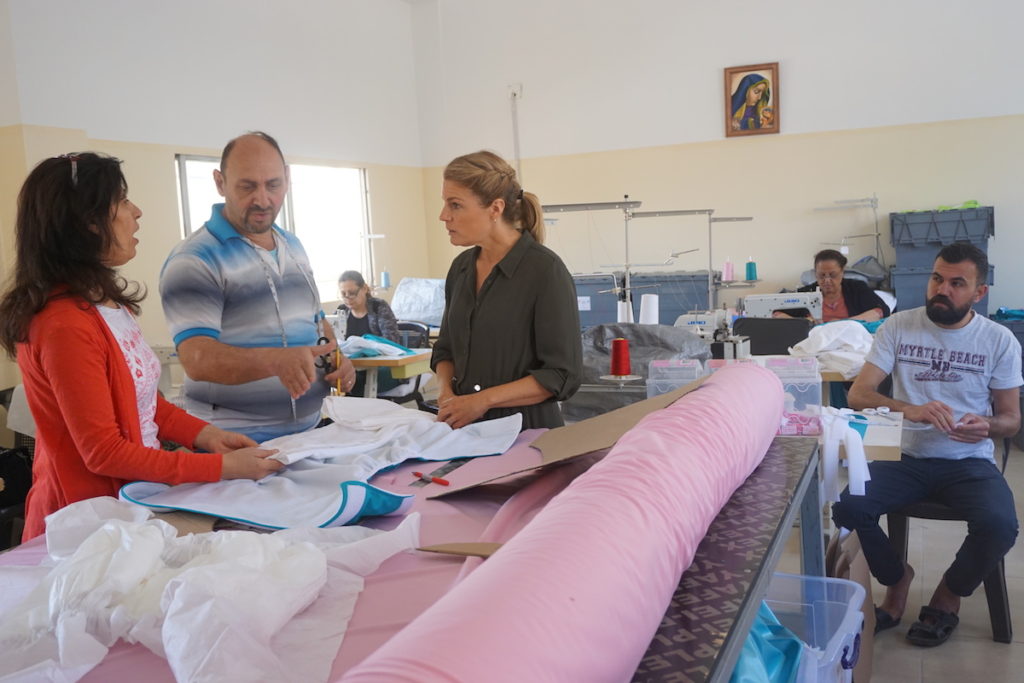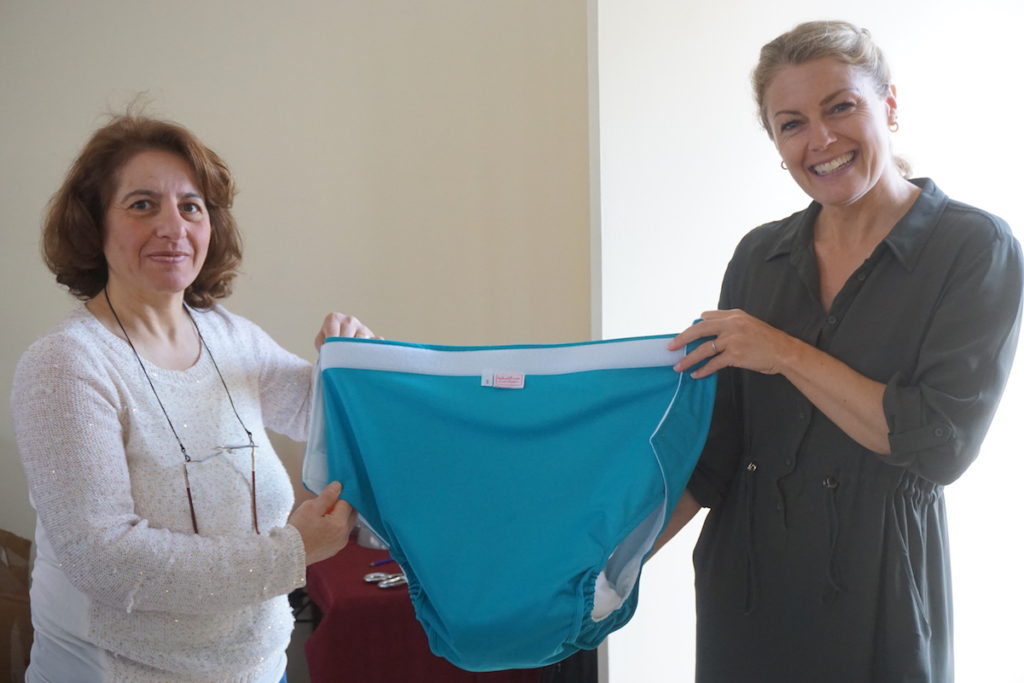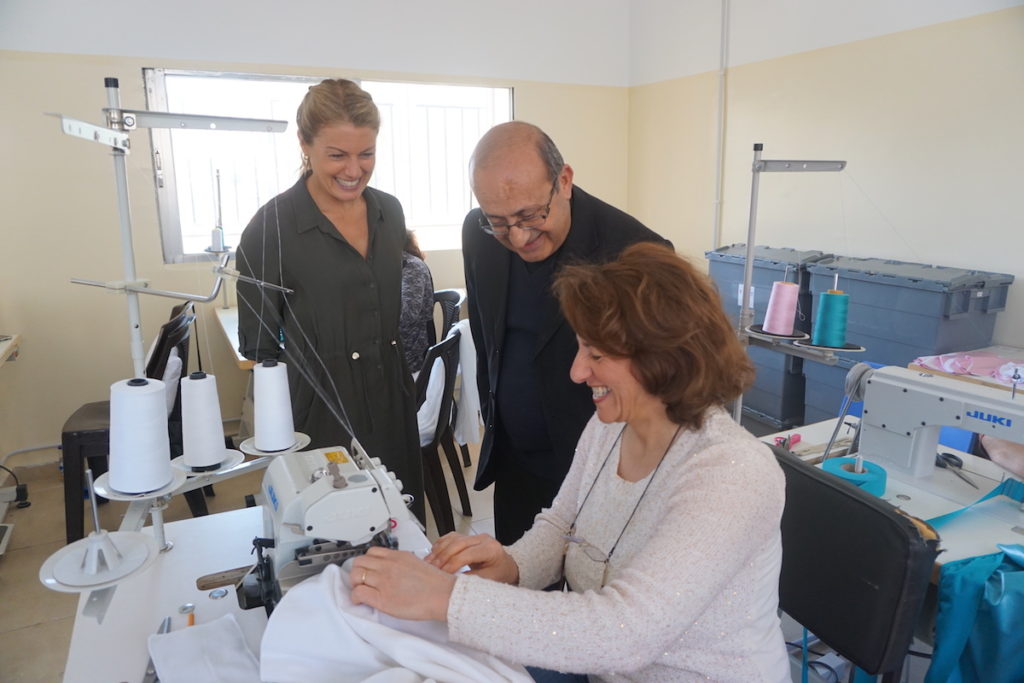AMMAN, Jordan (CNS) — A petite, dark-haired woman busily measures and cuts large pieces of pastel pink and blue fleecy material as another sews.

“We left Iraq with our most precious possessions. ISIS stole everything from us, but thank God, they did take not our daughters,” the woman, known as Um Rita by her colleagues, told Catholic News Service, her eyes welling with tears.
Many Iraqi Christians, who fled Islamic State militants in August 2014, are still displaced, both inside Iraq and as refugees in neighboring lands, such as Jordan.
But Fr. Khalil Jaar and British humanitarian Amy Peake have teamed up on an initiative that provides a livelihood to some of his Iraqi refugee parishioners, who have run short of funds, in a crowded section of Amman, the Jordanian capital.
“We have around 800 Iraqi refugee families living in my parish in Marka. They came after ISIS took Mosul and arrived here with almost nothing,” explained Fr. Jaar, who has devoted his ministry to aiding Iraqi and Syrian refugees flooding into Jordan from neighboring conflicts for more than a decade.
“Unlike the Syrian refugees, the Iraqis are not allowed to work. They don’t receive any help from nongovernmental organizations,” he told CNS. “So, you can imagine the situation of these families. I am looking to find a way for them to live in human dignity, to work and to have some money,” said Fr. Jaar, who grew up as a Palestinian refugee from Bethlehem, West Bank.
The Jordanian government grants work permits to some Syrian refugees, but others, such as Iraqis and Yemenis, are not officially allowed to work. But Fr. Jaar explained that Iraqis working in the church and on the compound may do so, because they are Christian and it’s a Catholic institution which has been helping them.
“When Amy visited our center, I felt her heart was burdened. She told me, ‘Father, I have a problem.’ ‘I have the solution,’ I told her.” And he chuckled, recounting their first meeting at his parish compound, Our Lady Mother of the Church.
Peake told CNS that at Zaatari, Jordan’s biggest refugee camp for Syrians, she had created a factory to produce high-quality washable diapers — known in Britain as “nappies” — and sanitary pads to aid Syrian refugee residents suffering from incontinence, including traumatized children, the elderly and the disabled. The diapers are free; the idea was to help keep the refugees from spending most of their monthly stipend on disposable diapers.


“Not everybody is going to want to use a washable nappy for obvious reasons. But the 60% of people who carried on using them said they saved 25% of their monthly income — which is a huge amount of money,” Peake explained.
Despite the positive results, the United Nations decided not to continue the project.
“Amy proposed to put the sewing machines here and immediately I gave her a big room, because we solve Amy’s problem as well as the problems of many Iraqi refugees in our parish. I see the Lord resolving so many issues,” said Fr. Jaar. At this time, more than 20 Iraqi Christians are working in the diaper factory.
“Behind each one working in the factory is a family to support with about five children. So, I do thank the Lord for this grace, this blessing he sent to us. I also thank Amy and everyone behind this fantastic relief service,” said the priest. “The families are given the opportunity to work in human dignity, not to beg for the needs of their family.”


Fr. Jaar said the Iraqi Christians who fled Islamic State are well-educated and skilled. They want the possibility to work, rather than receiving handouts.
“I remember during a food coupon distribution, I saw an Iraqi man crying,” he recalled. “I asked him, ‘Has someone hurt you? Why are you are crying? Why are you sad?’ He said,
‘No, Father, I am sad for myself. The work you are doing to help these people, this used to be my work in Mosul. I was a very rich man and I used to help people. Now, I am asking for someone to help me.'”
— Iraqi man
“You can imagine the frustration of these people,” Fr. Jaar said, adding that this man now has a responsible role in the factory. “My duty is to support them, to encourage them, to tell them that you are suffering, but you are suffering for a very high, noble reason: to preserve your faith. For you, for me, you are the living saints in my parish. I thank you for living with me.”
Diapers are distributed to churches working with Iraqi refugees in Amman and nearby Fuhais, as well as organizations such as “the House of Peace for the Elderly” (Dar es Salam for the Elderly), located in Amman, founded and run by Mother Teresa’s Missionaries of Charity. The Collateral Repair Project, which assists 10,000 refugee families in Jordan, is also involved in locating refugees who need the washable diapers.
— By Dale Gavlak, Catholic News Service.





